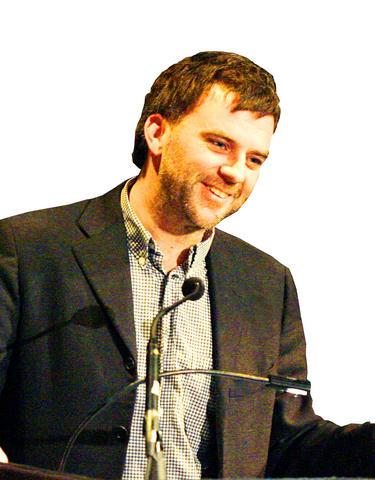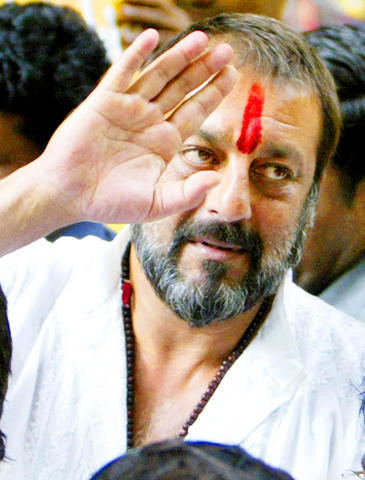The Berlin Film Festival announced the first of the movies that will compete for top honors at this coming February's festival with a raft of films from China, Brazil, Mexico, Britain, the US, Poland and Germany.
In Love We Trust (左右) from Chinese director Wang Xiaoshuai (王小帥), There Will Be Blood from US director Paul Thomas Anderson and Katyn from Oscar-winning Polish director Andrzej Wajda were all included in the lineup.
Never shy of tackling highly charged international political issues, organizers have also selected Oscar-winning documentary filmmaker Errol Morris' new movie S.O.P. Standard Operating Procedure, which examines abuse and torture of suspected terrorists at the hands of US forces at the Abu Ghraib prison.

PHOTO: AP
Also scheduled to premier at the 2008 Berlinale will be Kirschblueten - Hanami (Cherry Blossoms - Hanami) from leading German director Doris Doerrie and Brazilian box office hit Tropa de Elite (The Elite Squad) from director Jose Padilha.
Now in its 58th year, the Berlinale is one of the world's top three festivals along with Cannes and Venice.
US Commerce Secretary Carlos Gutierrez called on China to end its annual quota on foreign film imports.

PHOTO: AP
Gutierrez, in China for trade talks, said Beijing had imposed a routine temporary suspension on foreign film imports. China generally limits foreign film imports to about 20 a year to protect domestic filmmakers.
Last week, the Hollywood trade magazine Variety reported that China was banning all Hollywood movies for three months to protect local films. It said the ban would last until the end of February, but may be extended until May.
The report did not identify its sources and was quickly denied by Zhang Pimin (張丕民), deputy director-general of China's Film Bureau and the vice president of import and export business at state-run China Film Group.
A satirical Palestinian film that reverses the roles of occupier and occupied is one of three full-length feature films, along with a few shorts, shot in Palestine this year with relatively large budgets.
Enas Muthaffar's short film, Occupazion, shows Israeli protesters angrily waving blue and white Israeli flags while they demonstrate against Palestinian rule, one of them, wearing a headscarf, parodied of Palestinians'.
"Each Palestinian film made is a miracle," said George Khleifi, co-author of a book on the subject.
There's little official support for filmmakers, but Annemarie Jacir, director of Salt of this Sea, shot in the West Bank this year, obtained European funding of US$1.2 million.
The films tell stories through Palestinian eyes, trying to get beyond the simplicity of news coverage, which the artists say often reduces Palestinians to either militants or victims.
"Humor, passion, beauty, all of it is overlooked," said director Najwa Najjar, who just completed shooting a feature-length film about a female Palestinian dancer whose husband is sent to an Israeli prison.
Bollywood actor Sanjay Dutt is spending time with his family and friends before returning to work less than two weeks after being granted bail in an illegal weapons possession case, a news report said.
India's top court granted Dutt, a well-known actor, bail pending an appeal of his conviction on charges of unlawful possession of three automatic rifles and a pistol.
"I am enjoying the luxury of time before I get down to serious work," Dutt told the Times of India newspaper.
The actor said he needed to unwind before filming EMI, an acronym for easy monthly installments, in which he plays a loan recovery agent used by a bank to make defaulters pay up.
His last film was the 2006 hit Lage Raho Munnabhai (Carry on Munnabhai). A trial court sentenced Dutt to six years in prison in July for possessing weapons supplied by men subsequently convicted in the 1993 Mumbai bombings.
Dutt was acquitted in November 2006 of terrorism and conspiracy charges, but the actor has served nearly 20 months over three separate stretches in prison since he was first arrested in 1994.
"I have a strong belief in God, my loved ones, my fans, and most importantly in myself," Dutt said. "I will bounce back again."

June 2 to June 8 Taiwan’s woodcutters believe that if they see even one speck of red in their cooked rice, no matter how small, an accident is going to happen. Peng Chin-tian (彭錦田) swears that this has proven to be true at every stop during his decades-long career in the logging industry. Along with mining, timber harvesting was once considered the most dangerous profession in Taiwan. Not only were mishaps common during all stages of processing, it was difficult to transport the injured to get medical treatment. Many died during the arduous journey. Peng recounts some of his accidents in

“Why does Taiwan identity decline?”a group of researchers lead by University of Nevada political scientist Austin Wang (王宏恩) asked in a recent paper. After all, it is not difficult to explain the rise in Taiwanese identity after the early 1990s. But no model predicted its decline during the 2016-2018 period, they say. After testing various alternative explanations, Wang et al argue that the fall-off in Taiwanese identity during that period is related to voter hedging based on the performance of the Democratic Progressive Party (DPP). Since the DPP is perceived as the guardian of Taiwan identity, when it performs well,

The Taiwan People’s Party (TPP) on May 18 held a rally in Taichung to mark the anniversary of President William Lai’s (賴清德) inauguration on May 20. The title of the rally could be loosely translated to “May 18 recall fraudulent goods” (518退貨ㄌㄨㄚˋ!). Unlike in English, where the terms are the same, “recall” (退貨) in this context refers to product recalls due to damaged, defective or fraudulent merchandise, not the political recalls (罷免) currently dominating the headlines. I attended the rally to determine if the impression was correct that the TPP under party Chairman Huang Kuo-Chang (黃國昌) had little of a

At Computex 2025, Nvidia CEO Jensen Huang (黃仁勳) urged the government to subsidize AI. “All schools in Taiwan must integrate AI into their curricula,” he declared. A few months earlier, he said, “If I were a student today, I’d immediately start using tools like ChatGPT, Gemini Pro and Grok to learn, write and accelerate my thinking.” Huang sees the AI-bullet train leaving the station. And as one of its drivers, he’s worried about youth not getting on board — bad for their careers, and bad for his workforce. As a semiconductor supply-chain powerhouse and AI hub wannabe, Taiwan is seeing